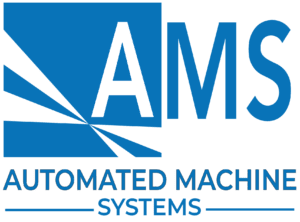
Who Has Your Back? Questions to Ask Before Outsourcing Medical Supply Manufacturing
At AMS we don’t manufacture medical supplies or supply end-user medical goods. But we do design and build automated manufacturing systems that our customers use to assemble all sorts of consumer and industrial goods, including medical supplies. Through our work with medical device manufacturers, we’ve seen what attributes their customers value. So, if you are looking for a manufacturer for your medical supplies, here are some questions to ask during the selection process.
What manufacturing processes and technologies do you offer for my type of product?
Landmark manufacturers continually invest in modern fabrication technologies to provide both higher component quality as well as fewer production errors. Buyers benefit from this in two ways: First, newer machine technologies mean that your products may be more reliable and durable than if they were produced with older technologies. Second, these manufacturers often extend more competitive pricing as they have leaner, more efficient production, less waste and therefore lower overhead.
How do you approach quality assurance?
Some manufacturers will describe a paper-heavy, hand-inspection process to meet their QA objectives. While this human touch can be reassuring for some ultra-critical, low volume products, does it seem reasonable or necessary given the type and volume of products you’re purchasing? Modern QA programs integrate directly with the manufacturing equipment producing your components through the use of onboard, instrumentation and real-time condition reporting. QA issues can be addressed within the manufacturing process, not by waiting for rejection at the end of the line. Detailed reports can be generated by the manufacturing equipment straight away to prove that each assembly step was completed successfully.
Do you take a just-in-time approach or do you stock inventory?
While not specifically an equipment question, this line of discussion aims to understand a manufacturer’s larger supply chain as it relates to reliably supplying your products. Especially with today’s logistics and raw material market volatility, selecting a manufacturer that has both sufficient inventory and machine capacity to meet your supply needs is a critical detail to understand. This discussion may lead to tangential topics, such as if the manufacturer has load-balancing relationships with other companies, channels to secure additional fabrication equipment (such as from AMS) in a timely fashion, and if they have ample external technical support (also such as from AMS!) should a manufacturing system unexpectedly go down. (Many of our customers select ongoing maintenance and service contracts for exactly these reasons.)
What is your proof-of-concept process for producing new products?
If your product is non-standard, a new invention or a work in progress needing manufacturing validation, ask plenty of questions to vet out the manufacturer’s development process. Many manufacturers invest in equipment that offers highly flexible, customizable and self-optimizing features specifically intended to accommodate emergent product designs. Further, if the manufacturer has a strong relationship with their equipment builder, performing a joint proof-of-concept run is a very viable option. For example, AMS’s test systems and applications lab can rapidly create equipment workflows around new product types that, once approved, can be deployed to our customers’ existing equipment right away.
Who is my point of contact?
While this question has nothing to do with manufacturing equipment, it has everything to do with your peace of mind. Quality, transparent manufacturers provide individuals who serve as your advocate, and you should work to establish a solid, personal relationship with that contact (or contacts) before hitching your wagon to their horse. Here at AMS, we assign dedicated account and project managers to our customers so that there is always an invested person on the other end of the phone whenever a need arises. In some cases, piece-rate manufacturers do not provide this resource on the grounds of keeping their costs low, which is a perfectly fair strategy so long as you agree to this up front. But, if you are looking for personal attention and wish to build a direct, long-term business relationship with a manufacturer, be sure to ask all about their customer service approach including who on their team has your back.
Questions About Manufacturing Medical Supplies
Manufacturing medical supplies, whether they’re new to the market or a proven product, is an exciting venture. If you have questions about manufacturing automation, contact us to start the conversation.
Our Automated Medical Manufacturing White Paper Will Help You Envision New Ways of Operating
Reading this white paper will help you:
